高一英语必修一电子课本
(完整版)高中英语人教版必修一课文内容电子版Unit2

Unit 2 English around the worldThe road to modern EnglishAt the end of the 16th century, about five to seven million people spoke English. Nearly all of them lived in England. Later in the next century, people from England made voyages to conquer other parts of the world and because of that, English began to be spoken in many other countries. Today, more people speak English as their first, second or foreign language than ever before.Native English speakers can understand each other even if they don’t speak the same kind of English. Look at this example:British Betty: Would you like to see my flat?American Amy: Yes. I’d like to come up to your apartment.So why has English changed over time? Actually, all languages change and develop when cultures meet and communicate with each other. At first, the English spoken in England between about AD 450 and 1150 was very different from the English spoken today. It was based more on German than the English we speak at present. Then gradually between about AD 800 and 1150, English became less like German because those who ruled England spoke first Danish and later French. These new settlers enriched the English language and especially its vocabulary. So by the 1600’s Shakespeare was able to make use of a wider vocabulary than ever before. In 1620 some British settlers moved to America. Later in the 18th century some British people were taken to Australia too. English began to be spoken in both countries.Finally by the 19th century the language was settled. At that time two big changes in English spelling happened: first Samuel Johnson wrote his dictionary and later Noah Webster wrote The America Dictionary of the English Language. The latter gave a separate identity to American English spelling.English now is also spoken as a foreign or second language in South Asia. For example, India has a very large number of fluent English speakers because Britain ruled India from 1765 to 1947. During that time English became the language for government and education. English is also spoken in Singapore and Malaysia and countries in Africa such as South Africa. Today the number of people learning English in China is increasing rapidly. In fact, China may have the largest number of English learners. Will Chinese English develop its own identity? Only time will tell.STANDARD ENGLISH AND DIALECTSWhat is standard English? Is it spoken in Britain, the US, Canada, Australia, India and New Zealand? Believe it or not, there is no such thing as standard English. This is because in the early days of radio, those who reported the news were expected to speak excellent English. However, on TV and the radio you will hear differences in the way people speak.When people use words and expressions different from “standard language”, it is called a dialect. American English has many dialects, especially the midwestern, southern, African American and Spanish dialects. Even in some parts of the USA, two people from neighboring towns speak a little differently. American English has so many dialects because people have come from all over the world.Geography also plays a part in making dialects. Some people who live in the mountains of the eastern USA speak with an older kind of English dialect. When Americans moved from one place to another, they took their dialects with them. So people from the mountains in the southeastern USA speak with almost the same dialect as people in the northwestern USA. The USA is a large country in which many different dialects are spoken. Although many Americans move a lot, they still recognize and understand each other’s dialects.。
高一英语必修一电子课本四川省专用
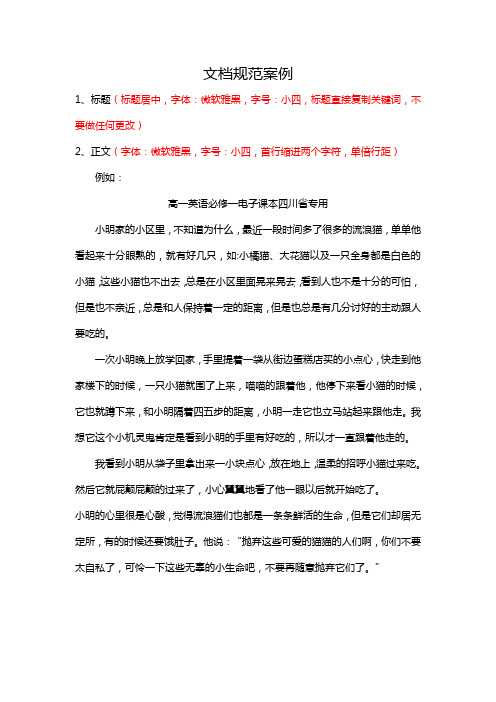
文档规范案例
1、标题(标题居中,字体:微软雅黑,字号:小四,标题直接复制关键词,不要做任何更改)
2、正文(字体:微软雅黑,字号:小四,首行缩进两个字符,单倍行距)
例如:
高一英语必修一电子课本四川省专用
小明家的小区里,不知道为什么,最近一段时间多了很多的流浪猫,单单他看起来十分眼熟的,就有好几只,如:小橘猫、大花猫以及一只全身都是白色的小猫,这些小猫也不出去,总是在小区里面晃来晃去,看到人也不是十分的可怕,但是也不亲近,总是和人保持着一定的距离,但是也总是有几分讨好的主动跟人要吃的。
一次小明晚上放学回家,手里提着一袋从街边蛋糕店买的小点心,快走到他家楼下的时候,一只小猫就围了上来,喵喵的跟着他,他停下来看小猫的时候,它也就蹲下来,和小明隔着四五步的距离,小明一走它也立马站起来跟他走。
我想它这个小机灵鬼肯定是看到小明的手里有好吃的,所以才一直跟着他走的。
我看到小明从袋子里拿出来一小块点心,放在地上,温柔的招呼小猫过来吃。
然后它就屁颠屁颠的过来了,小心翼翼地看了他一眼以后就开始吃了。
小明的心里很是心酸,觉得流浪猫们也都是一条条鲜活的生命,但是它们却居无定所,有的时候还要饿肚子。
他说:“抛弃这些可爱的猫猫的人们啊,你们不要太自私了,可怜一下这些无辜的小生命吧,不要再随意拋弃它们了。
”。
高中英语人教版必修一全册课文内容电子版
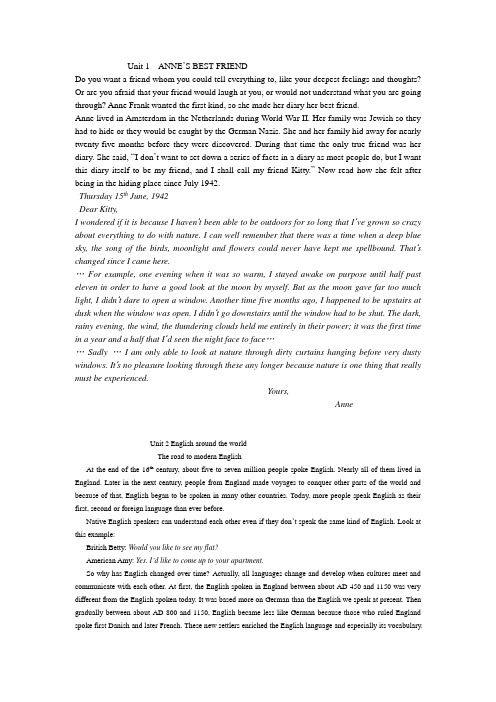
Unit 1 ANNE’S BEST FRIENDDo you want a friend whom you could tell everything to, like your deepest feelings and thoughts? Or are you afraid that your friend would laugh at you, or would not understand what you are going through? Anne Frank wanted the first kind, so she made her diary her best friend.Anne lived in Amsterdam in the Netherlands during World War II. Her family was Jewish so they had to hide or they would be caught by the German Nazis. She and her family hid away for nearly twenty-five months before they were discovered. During that time the only true friend was her diary. She said, “I don’t want to set down a series of facts in a diary as most people do, but I want this diary itself to be my friend, and I shall call my friend Kitty.”Now read how she felt after being in the hiding place since July 1942.Thursday 15th June, 1942Dear Kitty,I wondered if it is because I haven’t been able to be outdoors for so long that I’ve grown so crazy about everything to do with nature. I can well remember that there was a time when a deep blue sky, the song of the birds, moonlight and flowers could never have kept me spellbound. That’s changed since I came here.…For example, one evening when it was so warm, I stayed awake on purpose until half past eleven in order to have a good look at the moon by myself. But as the moon gave far too much light, I didn’t dare to open a window. Another time five months ago, I happened to be upstairs at dusk when the window was open. I didn’t go downstairs until the window had to be shut. The dark, rainy evening, the wind, the thundering clouds held me entirely in their power; it was the first time in a year and a half that I’d seen the night face to face……Sadly …I am only able to look at nature through dirty curtains hanging before very dusty windows. It’s no pleasure looking through these any longer because nature is one thing that really must be experienced.Yours,AnneUnit 2 English around the worldThe road to modern EnglishAt the end of the 16th century, about five to seven million people spoke English. Nearly all of them lived in England. Later in the next century, people from England made voyages to conquer other parts of the world and because of that, English began to be spoken in many other countries. Today, more people speak English as their first, second or foreign language than ever before.Native English speakers can understand each other even if they don’t speak the same kind of English. Look at this example:British Betty: Would you like to see my flat?American Amy: Yes. I’d like to come up to your apartment.So why has English changed over time? Actually, all languages change and develop when cultures meet and communicate with each other. At first, the English spoken in England between about AD 450 and 1150 was very different from the English spoken today. It was based more on German than the English we speak at present. Then gradually between about AD 800 and 1150, English became less like German because those who ruled England spoke first Danish and later French. These new settlers enriched the English language and especially its vocabulary.So by the 1600’s Shakespeare was able to make use of a wider vocabulary than ever before. In 1620 some British settlers moved to America. Later in the 18th century some British people were taken to Australia too. English began to be spoken in both countries.Finally by the 19th century the language was settled. At that time two big changes in English spelling happened: first Samuel Johnson wrote his dictionary and later Noah Webster wrote The America Dictionary of the English Language. The latter gave a separate identity to American English spelling.English now is also spoken as a foreign or second language in South Asia. For example, India has a very large number of fluent English speakers because Britain ruled India from 1765 to 1947. During that time English became the language for government and education. English is also spoken in Singapore and Malaysia and countries in Africa such as South Africa. Today the number of people learning English in China is increasing rapidly. In fact, China may have the largest number of English learners. Will Chinese English develop its own identity? Only time will tell.STANDARD ENGLISH AND DIALECTSWhat is standard English? Is it spoken in Britain, the US, Canada, Australia, India and New Zealand? Believe it or not, there is no such thing as standard English. This is because in the early days of radio, those who reported the news were expected to speak excellent English. However, on TV and the radio you will hear differences in the way people speak.When people use words and expressions different from “standard language”, it is called a dialect. American English has many dialects, especially the midwestern, southern, African American and Spanish dialects. Even in some parts of the USA, two people from neighboring towns speak a little differently. American English has so many dialects because people have come from all over the world.Geography also plays a part in making dialects. Some people who live in the mountains of the eastern USA speak with an older kind of English dialect. When Americans moved from one place to another, they took their dialects with them. So people from the mountains in the southeastern USA speak with almost the same dialect as people in the northwestern USA. The USA is a large country in which many different dialects are spoken.Although many Americans move a lot, they still recognize and understand each other’s dialects.Unit 3 JOURNEY DOWN THE MEKONGPART I THE DREAM AND THE PLANMy name is Wang Kun. Ever since middle school, my sister Wang Wei and I have dreamed about taking a great bike trip. Two years ago she bought an expensive mountain bike and then she persuaded me to buy one. Last year, she visited our cousins, Dao Wei and Y u Hang at their college in Kunming. They are Dai and grew up in western Yunnan Province near the Lancang River, the Chinese part of the river that is called the Mekong River in other countries. Wang Wei soon got them interested in cycling too. After graduating from college, we finally got the chance to take a bike trip. I asked my sister, “Where are we going?” It was my sister who first had the idea to cycle along the entire Mekong River from where it begins to where it ends. Now she is planning our schedule for the trip.I am fond of my sister but she has one serious shortcoming. She can be really stubborn. Although she didn’t know the best way of getting to places, she insisted that she organize the trip properly. Now I know that the proper way is always her way. I kept asking her, “When are we leaving and when are we coming back?”I asked her whether she had looked at a map yet. Of course she hadn’t; my sister doesn’t care about details. So I told her that the source of the Mekong is in Qinghai Province. She gave me a determined look--the kind that said she would not change her mind. When I told her that our journey would begin at an altitude of more than 5,000 metres, she said itwould be an interesting experience. I know my sister well. Once she has made up her mind, nothing can change it. Finally, I had to give in.Several months before our trip, Wang Wei and I went to the library. We found a large atlas with good maps that showed details of world geography. From the atlas we could see that the Mekong River begins in a glacier on a mountain in Qinghai Province. At first the river is small and the water is clear and cold. Then it begins to move quickly. It becomes rapids as it passes through deep valleys, travelling across western Yunnan Province. Sometimes the river becomes a waterfall and enters wide valleys. We were both surprised to learn that half of the river is in China. After it leaves China and high altitude, the Mekong becomes wide, brown and warm. As it enters Southeast Asia, its pace slows. It makes wide bends or meanders through low valleys to the plains where rice grows. At last, the river delta enters the South China Sea.PART II A NIGHT IN THE MOUNTAINSAlthough it was autumn, the snow was already beginning to fall in Tibet. Our legs were so heavy and cold that they felt like blocks of ice. Have you ever seen snowmen ride bicycles? That’s what we looked like! Along the way children dressed in long wool coats stopped to look at us. In the late afternoon we found it was so cold that our water bottles froze. However, the lakes shone like glass in the setting sun and looked wonderful. Wang Wei rode in front of me as usual. She is very reliable and I knew I didn’t need to encourage her. To climb the mountains was hard work but as we looked around us, we were surprised by the view. We seemed to be able to see for miles. At one point we were so high that we found ourselves cycling through clouds. Then we began going down the hills. It was great fun especially as it gradually became much warmer. In the valleys colourful butterflies flew around us and we saw many yaks and sheep eating green grass. At this point we had to change our caps, coats, gloves and trousers for T-shirts and shorts.In the early evening we always stop to make camp. We put up our tent and then we eat. After supper Wang Wei put her head down on her pillow and went to sleep but I stayed awake. At midnight the sky became clearer and the stars grew brighter. It was so quiet. There was almost no wind- only the flames of our fire for company. As I lay beneath the stars I thought about how far we had already travelled.We will reach Dali in Yunnan Province soon, where our cousins Dao Wei and Yu Hang will join us. We can hardly wait to see them!Unit 4 A NIGHT THE EARTH DIDN’T SLEEPStrange things were happening in the countryside of northeast Hebei. For three days the water in the village wells rose and fell. Farmers noticed that the well walls had deep cracks in them. A smelly gas came out of the fields looking for places to hide. Fish jumped out of their bowls and ponds. At about 3:00 am on July 28, 1976, some people saw bright lights in the sky. The sound of planes could be heard outside the city of Tangshan even when no planes were in the sky. In the city, the water pipes in some buildings cracked and burst. But the one million people of the city, who thought little of these events, were asleep as usual that night.At 3:42 am everything began to shake. It seemed as if the world was at an end! Eleven kilometres directly below the city one of the greatest earthquakes of the 20th century had begun. It was felt in Beijing, which is more than two hundred kilometres away. One-third of the nation felt it. A huge crack that was eight kilometres long and thirty metres wide cut across houses, roads and canals. Steam burst from holes in the ground. Hard hills of rock became rivers of dirt. In fifteen terrible seconds a large city lay in ruins. The sufferings of the people was extreme. Two-thirds ofthem died or were injured during the earthquake. The number of people who were killed or seriously injured reached more than 400,000.But how could the survivors believe it was natural? Everywhere they looked nearly everything was destroyed. All of the city’s hospital, 75%of its factories and buildings and 90%of its homes were gone. Bricks covered the ground like red autumn leaves. No wind, however, could blow them away. Two dams fell and most of the bridges also fell or were not safe for travelling. The railway tracks were now useless pieces of steel. Tens of thousands of cows would never give milk again. Half a million pigs and millions of chickens were dead. Sand now filled the wells instead of water. People were shocked. Then, later that afternoon, another big quake which was almost as strong as the first one shook Tangshan. Water, food, and electricity were hard to get. People began to wonder how long the disaster would last.All hope was not lost. Soon after the quakes, the army sent 150,000 soldiers to Tangshan to help the rescue workers. Hundreds of thousands of people were helped. The army organized teams to dig out those who were trapped and to bury the dead. To the north of the city, most of the 10,000 miners were rescued from the coal mines there. Workers built shelters for survivors whose homes had been destroyed. Fresh water was taken to the city by train, truck and plane. Slowly, the city began to breathe again.UNIT 5 ELIAS’ STORYMy name is Elias. I am a poor black worker in South Africa. The time when I first met Nelson Mandela was a very difficult period of my life. I was twelve years old. It was in 1952 and Mandela was the black lawyer to whom I went for advice. He offered guidance to poor black people on their legal problems. He was generous with his time, for which I was grateful.I needed his help because I had very little education. I began school at six. The school where I studied for only two years was three kilometres away. I had to leave because my family could not continue to pay the school fees and the bus fare. I could not read or write well. After trying hard, I got a job in a gold mine. However, this was a time when one had got to have a passbook to live in Johannesburg. Sadly I did not have one because I was not born there, and I worried about whether I would become out of work.The day when Nelson Mandela helped me was one of my happiest. He told me how to get the correct papers so I could stay in Johannesburg. I became more hopeful about my future. I never forgot how kind Mandela was. When he organized the ANC Youth League, I joined it as soon as I could. He said:“The last thirty years have seen the greatest number of laws stopping our rights and progress, until today we have reached a stage where we have almost no rights at all.”It was the truth. Black people could not vote or choose their leaders. They could not get the jobs they wanted. The parts of town in which they had to live were decided by white people. The places outside the towns where they were sent to live were the poorest parts of South Africa. No one could grow food there. In fact as Nelson Mandela said:“…we were put into a position in which we had either to accept we were less important, or fight the government.We chose to attack the laws. We first broke the law in a way which was peaceful; when this was not allowed…only then did we decided to answer violence with violence. ”As a matter of fact, I do not like violence…but in 1963 I helped him blow up some government buildings. It was very dangerous because if I was caught I could be put in prison. But I was happy to help because I knew it would help us achieve our dream of making black and white people equal.THE REST OF ELIAS’ STORYYou cannot imagine how the name of Robben Island made us afraid. It was a prison from which no one escaped. There I spent the hardest time of my life. But when I got there Nelson Mandela was also there and he helped me. Mr Mandela began a school for those of us who had little learning. He taught us during the lunch breaks and the evenings when we should have been asleep. We read books under our blankets and used anything we could find to make candles to see the words. I became a good student. I wanted to study for my degree but I was not allowed to do that. Later, Mr Mandela allowed the prison guards to join us. He said they should not be stopped from studying for their degrees. They were not cleverer than me, but they did pass their exams. So I knew I could get a degree too. That made me feel good about myself.When I finished the four years in prison, I went to find a job. Since I was better educated, I got a job working in an office. However, the police found out and told my boss that I had been in prison for blowing up government buildings. So I lost my job. I did not work again for twenty years until Mr Mandela and the ANC came to power in 1994. All that time my wife and children had to beg for food and help from relatives or friends. Luckily Mr Mandela remembered me and gave me a job taking tourists around my old prison on Robben Island. I felt bad the first time I talked to a group. All the terror and fear of that time came back to me. I remembered the beatings and the cruelty of the guards and my friends who had died. I felt I would not be able to do it, but my family encouraged me. They said that the job and the pay from the new South Africa government were my reward after working all my life for equal rights for the Blacks. So now I am proud to show visitors over the prison, for I helped to make our people free in their own land.。
2023人教版高一英语必修一电子课本
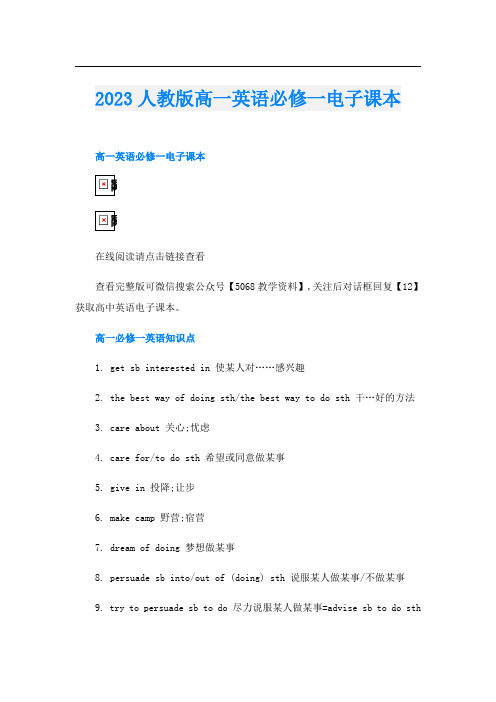
2023人教版高一英语必修一电子课本高一英语必修一电子课本在线阅读请点击链接查看查看完整版可微信搜索公众号【5068教学资料】,关注后对话框回复【12】获取高中英语电子课本。
高一必修一英语知识点1. get sb interested in 使某人对……感兴趣2. the best way of doing sth/the best way to do sth 干…好的方法3. care about 关心;忧虑4. care for/to do sth 希望或同意做某事5. give in 投降;让步6. make camp 野营;宿营7. dream of doing 梦想做某事8. persuade sb into/out of (doing) sth 说服某人做某事/不做某事9. try to persuade sb to do 尽力说服某人做某事=advise sb to do sth10. insist on sth/doing sth 一定要(某事);坚决主张11. make up ones mind 下定决心12. put up ones tents 搭起帐篷13. set /break(beat)/hold a record 创造/打破/保持记录14. have a dream of sb/sth/doing sth 梦见某人/某物/梦想……15. dream of/about... dream a dream16. be determined to do sth 决心干某事 (表状态)17. determine sb to do sth 使某人下决心做某事(表动作)18. sb be familiar with sth 某人熟悉某物sth be familiar to sb 某物被某人所熟悉sb be familiar with sb 某人与某人亲密无间19. A be similar to B A与B相似20. read ones mind 看出某人心事高一英语人教版必修一练习题一)把句子补充完整1. 你把所有的数加起来就会知道You will know the __________ when you _______ ________ all the numbers.2. 我们努力想让他平静下来,但他还是激动地大叫。
人教版高中英语电子课本(必修1)(2020年,Word版)

必修1 第一单元Reading 阅读ANNE’S BEST FRIENDDo you want a friend whom you could tell everything to, like your deepest feel ings and thoughts? Or are you afraid that your friend would laugh at you, or would not understand what you are going through? Anne Frank wanted the first kind, so she made her diary her best friend.安妮最好的朋友你想不想有一位无话不谈能推心置腹的朋友?或者你会不会担心你的朋友会嘲笑你,会不理解你目前的困境呢?安妮?弗兰克想要的是第一种类型的朋友,所以她把的日记视为自己最好的朋友。
Anne lived in Amsterdam in the Netherlands during World War II. Her family w as Jewish so the had to hide or they would be caught by the German Nazis. She and her family hide away for two years before they were discovered. During that t ime the only true friend was her diary. She said, “I don’t want to set down a serie s of facts in a diary as most people do, but I want this diary itself to be my friend, and I shall call my friend Kitty.” Now read how she felt after being in the hiding p lace since July 1942.在第二次世界大战期间,安妮住在荷兰的阿姆斯特丹。
北师大版高中英语必修一课文(电子版)
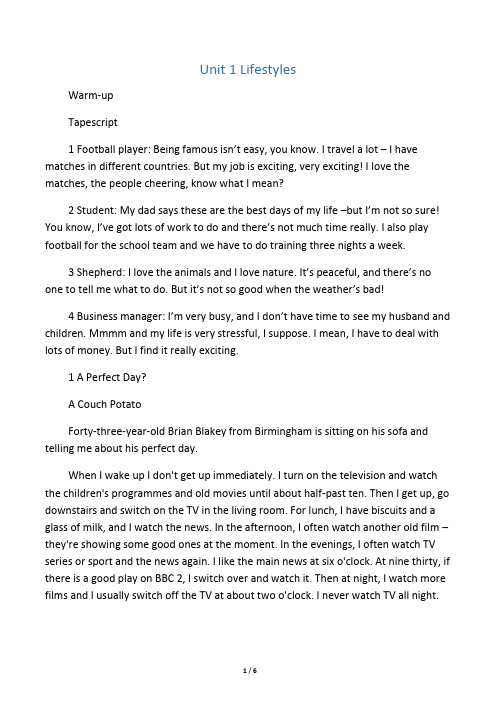
Unit 1 LifestylesWarm-upTapescript1 Football player: Being famous isn’t easy, you know. I travel a lot – I have matches in different countries. But my job is exciting, very exciting! I love the matches, the people cheering, know what I mean?2 Student: My dad says these are the best days of my life –but I’m not so sure! You know, I’ve got lots of work to do and there’s not much time really. I also play football for the school team and we have to do training three nights a week.3 Shepherd: I love the animals and I love nature. It’s peaceful, and there’s no one to tell me what to do. But it’s not so good when the weather’s bad!4 Business manager: I’m very busy, and I don’t have time to se e my husband and children. Mmmm and my life is very stressful, I suppose. I mean, I have to deal with lots of money. But I find it really exciting.1 A Perfect Day?A Couch PotatoForty-three-year-old Brian Blakey from Birmingham is sitting on his sofa and telling me about his perfect day.When I wake up I don't get up immediately. I turn on the television and watch the children's programmes and old movies until about half-past ten. Then I get up, go downstairs and switch on the TV in the living room. For lunch, I have biscuits and a glass of milk, and I watch the news. In the afternoon, I often watch another old film –they're showing some good ones at the moment. In the evenings, I often watch TV series or sport and the news again. I like the main news at six o'clock. At nine thirty, if there is a good play on BBC 2, I switch over and watch it. Then at night, I watch more films and I usually switch off the TV at about two o'clock. I never watch TV all night.I watch TV for sixteen or seventeen hours a day. I also do some exercise every day. I take Tina, the dog, for a walk every afternoon. I don't go far, of course. I walk to the wall outside my house. I always take my portable TV and I sit on the stone wall while the dog walks round in a circle.Of course, I couldn't live this lifestyle without a good wife. She's not here now because she's working, but she always makes my meals. We haven't got much money, you know, but we're happy. Sit down and watch TV. Here's the remote control.You've got the world at your feet. And in your hand. Great!A WorkaholicThirty-six-year-old Bob Black is sitting at his desk and working his way through his paperwork. I normally wake up about five minutes before my alarm clock goes off. As soon as I hear my alarm clock, I jump out of my bed. It takes me less than fifteen minutes to wash, get changed, have breakfast, leave home and get on a bus.I am always the first person to get to the office. The mornings are always very busy and the afternoons are even busier! Meetings and phone calls take up a large part of the day. Every minute of the day is filled with urgent matters. By around eight o'clock, I usually find some time to do my own paperwork and answer some personal e-mails.When I get home at about ten, I look at some documents that I bring back from the office so that I can be ready for the next day's work. I get to bed around midnight when my wife and children are already asleep.But I try to work hard so that I can make more money for them. Besides, I get bored if there's nothing to do. I like being busy.2 RelaxingTapescriptKlinsmann.Doctor: Good morning.Presenter: Dr Klinsmann … er … what kinds of people often suffer from stress?Doctor: Well, anybody can suffer from stress. There are certain jobs that are very stressful, like some jobs in business or the police. But, probably everyone suffers from stress at some time in their life – students, doctors, factory workers– anybody.Presenter: But, what really causes it?Presenter: And what can you do to stop stress and worry? Because stress is very bad for you, isn't it?Doctor: Yes, it can cause a lot of health problems. But to answer your question, there are lots of things you can do to reduce stress. You can organise your work or studies. For example, you can make a list and do all the important things first. You must eat well – have a good diet – and of course do exercise often. Finally, you can talk to people about your problems – talk to a friend, someone in your family or, if you're studying, talk to a teacher. You can also do special exercises.Presenter: Can you describe some of these …TapescriptMark: Things I find stressful. Well, I really hate … mm …doing exams. Mm, I get very nervous the night before, you know. And I can't sleep, you know what I mean? I'm also shy and I don't like going to parties very much. I prefer meeting people in small groups, you know. Ah, there's another thing – in French lessons I can't stand talking in front of the class, er, I get nervous and mm, make lots of mistakes. Things I find relaxing? Well, mm, I like a lot of things. I love talking to my friends. And whenI'm tired and want to relax I enjoy listening to music and I also like reading. Ah, I quite like sitting and doing nothing!3 A Volunteer TeacherTapescriptWS: Good morning.I: Wang Shu, tell us about your plan, please.WS: I'm going to work as a volunteer teacher in a small country town in Inner Mongolia.I: Really? You must be excited!WS: Oh yes, I'm really excited about it. (Section 1)I: But why did you make this decision?WS: Well, I've just graduated from university. As a teacher, I feel it's my duty to do something for students in poor areas.I: But life in Inner Mongolia is very hard and quite different from that in Beijing. Are you prepared for that?WS: Yes, I know life there will be especially hard for me. You know, I'm the only child in my family and I've always lived in Beijing. So, teaching in Inner Mongolia is going to be a great challenge for me. Maybe it will be very cold and maybe I'll only have a small room with a bed and a basin to wash up with but I really enjoy meeting new challenges. That's why I made the decision to go. (Section 2)I: What are you going to do there as a teacher?WS: I'm going to teach middle school students. I'll have lots of lesson plans to make and homework to mark. I'll be very busy.I: What do your parents think of your plan? Do they support you?WS: To tell the truth, they didn't like the idea when they first heard about my plan. But we had a long talk, and I finally won their support.I: And when are you leaving?WS: The train leaves at 9 tomorrow morning. So I'm getting up at about 6 to get everything ready. The new school term begins the day after I arrive. I can't wait to meet the students there. They are said to be very good students.I: I'm sure your parents are proud of you, and I believe you're going to have an exciting year. We're going to open our phone lines now. If you have any questions for Wang Shu, dial 555-6782 and she'll answer them for you. (Section 3)4 City and CountryI spend all morning checking numbers. Lunch is always simple. I often get a sandwich in a nearby sandwich shop or I just have some biscuits and a cup of coffee. Then in the afternoon, I return to the paperwork in the office.I go to the cinema almost every weekend. Sometimes, if the weather forecast is good, my friends and I drive to the countryside for a weekend break. We like to visit nice, quiet places far away from the city and go walking where there are no shops, crowds or the tube. That fresh air is so good for my lungs. I love it.Paul lives in a small village in the north of England.I usually get up at four o'clock every morning when it's still dark. I live and work on the farm so I don't need to travel. After a big breakfast in my house, I walk out of the front door and I'm already at work.There are many things to do on the farm all day. We don't have the same work hours that office workers in the city have. We do jobs when they need to be done and that could be early in the morning or late at night. I have cows, sheep, pigs and chickens on my farm. I have to make sure they are free of sickness. I also grow wheat and vegetables so there are many things to look after.In the evening, I like to play with my children. I have two children, a boy and a girl. They are six and eight years old. I also like to study. Right now I am studying Chinese by distance learning. I am very interested in China and it's my dream to see the Great Wall one day.I love movies. My wife calls me a “movie fan”. But there i sn't a cinema in my village so I don't get the chance to go very often. I go about twice a year, usually when I go to London with my family. We take a weekend break there when I am not too busy on the farm. My wife loves looking in the clothes shops and I like all the crowds and the noise. I also like to buy a few cigars. Unfortunately, my wife isn't asfond of them as I am. My son and daughter love to ride on London's red buses and they especially love to go on the tube!。
【人教版】2019版高中英语电子课本(必修1)(Word版,20页)
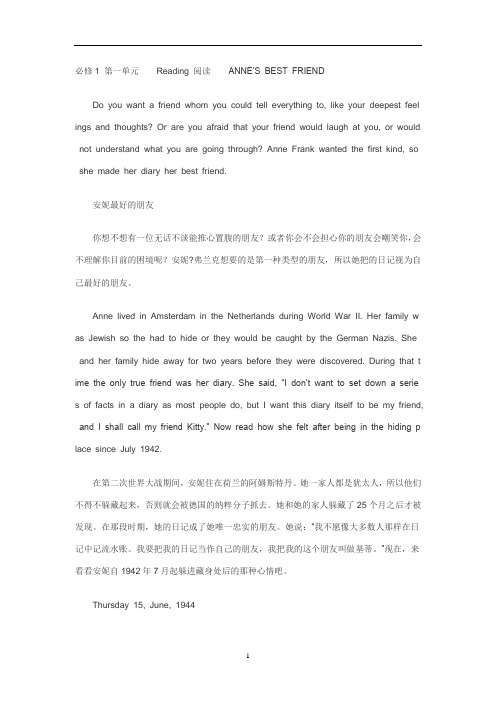
必修1 第一单元Reading 阅读ANNE’S BEST FRIENDDo you want a friend whom you could tell everything to, like your deepest feel ings and thoughts? Or are you afraid that your friend would laugh at you, or would not understand what you are going through? Anne Frank wanted the first kind, so she made her diary her best friend.安妮最好的朋友你想不想有一位无话不谈能推心置腹的朋友?或者你会不会担心你的朋友会嘲笑你,会不理解你目前的困境呢?安妮?弗兰克想要的是第一种类型的朋友,所以她把的日记视为自己最好的朋友。
Anne lived in Amsterdam in the Netherlands during World War II. Her family w as Jewish so the had to hide or they would be caught by the German Nazis. She and her family hide away for two years before they were discovered. During that t ime the only true friend was her diary. She said, “I don’t want to set down a serie s of facts in a diary as most people do, but I want this diary itself to be my friend, and I shall call my friend Kitty.” Now read how she felt after being in the hiding p lace since July 1942.在第二次世界大战期间,安妮住在荷兰的阿姆斯特丹。
高中英语必修一电子课本

高中英语必修一电子课本《高中英语必修一电子课本》是一本专为高中阶段学生设计的英语教材,旨在帮助学生掌握英语基础知识,提高英语听说读写能力。
本教材内容丰富,结构清晰,适合高中学生使用。
Unit 1: Greetings and IntroductionsIn this unit, students will learn how to greet people and introduce themselves in English. They will practice using common phrases such as "Hello," "How are you?" and "My name is...". Additionally, students will be introduced to the concept of personal pronouns and possessive adjectives.Unit 2: Daily RoutinesThis unit focuses on vocabulary and expressions related to daily routines. Students will learn how to talk about their daily activities, such as waking up, eating breakfast, going to school, and doing homework. They will also practice using the present simple tense to describe habitual actions.Unit 3: Hobbies and InterestsStudents will explore the topic of hobbies and interests in this unit. They will learn vocabulary related to various pastimes and activities, such as reading, sports, and music. The unit will also cover the use of the present continuous tense to describe ongoing actions.Unit 4: Describing PeopleIn this unit, students will learn how to describe people's appearance, personality traits, and relationships. They will practice using adjectives and comparative forms to compare people and things. The unit will also introduce the use of relative clauses to provide additional information about people.Unit 5: School LifeThis unit is centered around the theme of school life. Students will learn vocabulary related to school subjects, facilities, and activities. They will also practice using the past simple tense to talk about past events and experiences at school.Unit 6: Travel and TransportationStudents will explore the world of travel and transportation in this unit. They will learn vocabulary related to modes of transportation, places of interest, and travel experiences. The unit will also cover the use of the future simple tense to talk about plans and predictions.Unit 7: Food and DrinkIn this unit, students will learn about various types of food and drink, as well as how to describe their preferences and experiences with different cuisines. They will practice usingthe present perfect tense to talk about past experiences that have relevance to the present.Unit 8: Weather and SeasonsStudents will study the vocabulary and expressions related to weather and seasons in this unit. They will learn how to talk about different types of weather, the characteristics of each season, and how these factors affect daily life.Unit 9: Sports and FitnessThis unit is dedicated to the topic of sports and fitness. Students will learn vocabulary related to various sports, fitness activities, and healthy lifestyles. They will also practice using the present perfect continuous tense to describe ongoing actions that started in the past and continue to the present.Unit 10: Festivals and CelebrationsIn the final unit, students will learn about different festivals and celebrations around the world. They will explore the vocabulary and customs associated with these events, as well as practice using the past continuous tense to describe past actions that were happening at a specific time.Each unit includes a variety of activities, such as listening exercises, reading comprehension, grammar practice, and speaking activities, designed to engage students andreinforce their learning. The textbook also features a comprehensive glossary and answer key for self-study and review.。
高一必修一英语课本电子版
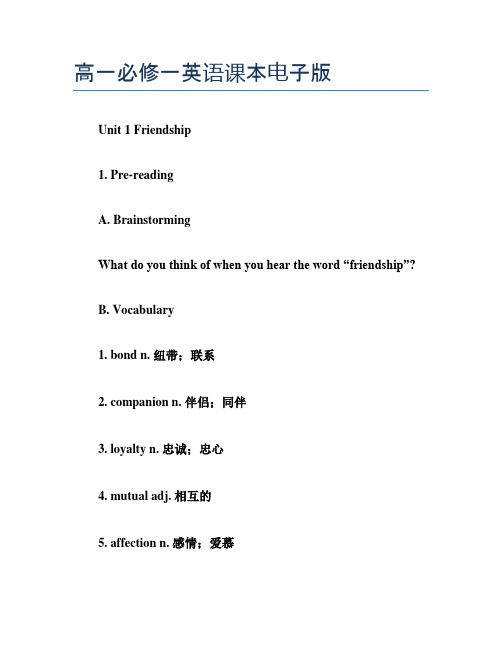
高一必修一英语课本电子版Unit 1 Friendship1. Pre-readingA. BrainstormingWhat do you think of when you hear the word “friendship”?B. Vocabulary1. bond n. 纽带;联系2. companion n. 伴侣;同伴3. loyalty n. 忠诚;忠心4. mutual adj. 相互的5. affection n. 感情;爱慕6. appreciate v. 感激;欣赏7. cherish v. 珍爱;珍视8. devotion n. 忠诚;献身2. While-readingA. Comprehension1. What is the main idea of the passage?The main idea of the passage is that friendship is a special bond between two people that is based on mutual trust, loyalty, and affection.2. What are the three qualities of a good friendship according to the passage?The three qualities of a good friendship according to the passage are trust, loyalty, and affection.3. What does the author mean by “cherish” in the passage?The author means to value and appreciate something or some one deeply when they use the word “cherish” in the passage.B. Language points1. Friendship is a special bond between two people that is based on mutual trust, loyalty, and affection.based on: 以…为基础E.g. The decision was based on the facts.2. We should appreciate and cherish our friends and show them our devotion.appreciate: 感激;欣赏E.g. I appreciate your help.cherish: 珍爱;珍视E.g. She cherishes the memory of her late husband.devotion: 忠诚;献身E.g. He has shown great devotion to his work.3. Post-readingA. DiscussionWhat do you think are the most important qualities of a good friendship?B. WritingWrite a short essay about the importance of friendship.。
(完整版)高中英语人教版必修一课文内容电子版Unit4
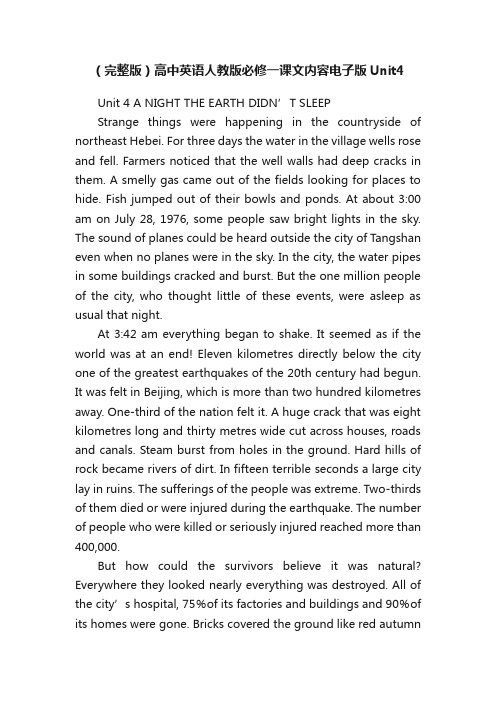
(完整版)高中英语人教版必修一课文内容电子版Unit4Unit 4 A NIGHT THE EARTH DIDN’T SLEEPStrange things were happening in the countryside of northeast Hebei. For three days the water in the village wells rose and fell. Farmers noticed that the well walls had deep cracks in them. A smelly gas came out of the fields looking for places to hide. Fish jumped out of their bowls and ponds. At about 3:00 am on July 28, 1976, some people saw bright lights in the sky. The sound of planes could be heard outside the city of Tangshan even when no planes were in the sky. In the city, the water pipes in some buildings cracked and burst. But the one million people of the city, who thought little of these events, were asleep as usual that night.At 3:42 am everything began to shake. It seemed as if the world was at an end! Eleven kilometres directly below the city one of the greatest earthquakes of the 20th century had begun. It was felt in Beijing, which is more than two hundred kilometres away. One-third of the nation felt it. A huge crack that was eight kilometres long and thirty metres wide cut across houses, roads and canals. Steam burst from holes in the ground. Hard hills of rock became rivers of dirt. In fifteen terrible seconds a large city lay in ruins. The sufferings of the people was extreme. Two-thirds of them died or were injured during the earthquake. The number of people who were killed or seriously injured reached more than 400,000.But how could the survivors believe it was natural? Everywhere they looked nearly everything was destroyed. All of the city’s hospital, 75%of its factories and buildings and 90%of its homes were gone. Bricks covered the ground like red autumnleaves. No wind, however, could blow them away. Two dams fell and most of the bridges also fell or were not safe for travelling. The railway tracks were now useless pieces of steel. Tens of thousands of cows would never give milk again. Half a million pigs and millions of chickens were dead. Sand now filled the wells instead of water. People were shocked. Then, later that afternoon, another big quake which was almost as strong as the first one shook Tangshan. Water, food, and electricity were hard to get. People began to wonder how long the disaster would last.All hope was not lost. Soon after the quakes, the army sent 150,000 soldiers to Tangshan to help the rescue workers. Hundreds of thousands of people were helped. The army organized teams to dig out those who were trapped and to bury the dead. To the north of the city, most of the 10,000 miners were rescued from the coal mines there. Workers built shelters for survivors whose homes had been destroyed. Fresh water was taken to the city by train, truck and plane. Slowly, the city began to breathe again.。
西安市高一英语必修一电子课本

西安市高一英语必修一电子课本学习不光要有不怕困难,永不言败的精神,还有有勤奋的努力,下面给大家带来一些关于高一英语课文必修一原文,希望对大家有所帮助。
unit1 anne’s best friendanne’s best friend do you want a friend whom you could tell everything to,like your deepest feelings and thoughts? or are you afraid that yourfriendwould laugh at you, or would not understand what you are going through? annefrank wanted the first kind, so she made her diary her best friend. anne livedin am sterdam in the netherlands during world war ⅱ. her family was jewish sonearly twenty-five months before they were discovered. during that timethe onlytrue friend was her diary. she said, ”i don’t want to set down a seriesof factsin a diary as most people do, but i want this diary itself to be my friend, andi shall call my friend kitty.” now read how she felt after being in the hidingplace since july . thursday 15th june, dear kitty, i wonder if it’sbecause i haven’t been able to be outdoors for so long that i’ve grownso crazyabout everything to do with nature. i can well remember that there was a timewhen a deep blue sky, the song of the birds, moonlight and flowers could neverhave kept me spellbound. that’s changed since i was here. …for example, oneevening when it was so warm, i stayed awake on purpose until half past eleven inorder to have a good look at the moon by my self. but as the moon gave far toomuch light, i didn’t dare ope n a window. another time five months ago, ihappened to be upstairs at dusk when the window was open. i didn’t go downstairsuntil the window bad to be shut. the dark, rainy evening, the wind, thethundering clouds held me entirely in their power; it was the first time in ayear and a half that i’d seen the night face to face… …sadly …i am only able tolook at nature through dirty curtains hanging before very dusty windows. it’s nopleasure looking through these any longer because nature is one thing thatreally must be experienced. yours, anneunit2 the road to modern englishthe road to modern english at the end of the 16th century, about five toseven million people spoke english. nearly all of them lived in england. laterin the next century, people from england made voyages to conquer other parts ofthe world, and because of that, english began to be spoken in many othercountries. today, more people speak english as their first, second or a foreignlanguage than ever before. native english speakers can understand each othereven if they don’t speak the same kind of english. look at this example: britishbetty: w ould you like to see my flat? american amy: yes. i’d like to come up toyou apartment. so why has english changed over time? actually all languageschange and develop when cultures meet and communicate with each other. at fistthe english spoken in england between about ad and was very differentfrom the english spoken today. it was base more on german than the english wespeak at present. then gradually between about ad and , english becameless like german because those who ruled england spoke first danish and laterfrench. these new settlers enriched the english language and especiallyitsvocabulary. so by the ’s shakespeare was able to make use of a widervocabulary than ever before. in some british settlers moved to america.later in the 18th century some british people were taken to australia to.english began to be spoken in both countries. finally by the 19th century thelanguage was settled. at that time two big changes in english spelling happened:first samuel johnson wrote his dictionary and later noah webster wrote theamerican dictionary of the english language. the latter gave a separate identityto american english spelling. english now is also spoken as a foreign or secondlanguage in south asia. for example, india has a very large number offluentenglish speakers because britain ruled india from to . during that timeenglish became the language for government and education. english is also spokenin singapore and malaysia and countries in africa such as south africa. todaythe number of people learning english in china is increasing rapidly. in fact,china may have the largest number of english learners. will chineseenglishdevelop its own identity? only time will tell.unit3 travel journaljourney down the mekong my name is wang kun. ever since middle school, mysister wang wei and i have dreamed about taking a great bike trip. two years agoshe bought an expensive mountain bike and then she persuaded me to buy one. lastyear, she visited our cousins, dao wei and yu hang at their college if kunming.they are dai and grew up in western yunnan province near the lancang river, thechinese part of the river that is called the mekong river in other countries.wang wei soon got time interested in cycling too. after graduating from college,we finally got the chance to take a bike trip. i asked my sister, “where are wegoing?” it was my sister who first had the idea to cycle along the entire mekongriver from where it begins to where it ends. now she is planning our schedulefor the trip. i am fond of my sister but she has one serious shortcoming. shecan be really stubborn. although she didn’t know the best way of getting toplaces, she insisted that she organize the trip properly. now i know that theproper w ay is always her way. i kept asking her, “when are we leaving and whenare we coming back?” i asked her whether she had looked at a map yet. of courseshe hadn’t; my sister doesn’t care about details. so i told her that the sourceof the mekong is in qinghai province. she gave me a determined look -- the kindthat said she would not change her mind. when i told her that our journey wouldbegin at an altitude of more than 5, meters, she seemed to be excited aboutit. when i told her the air would be hard to breathe and it would be very cold,she said it would be an interesting experience. i know my sister well. once shehas made up her mind, nothing can change it. finally, i had to give in. severalmonths before our trip, wang wei and i went to the library. we found a largeatlas with good maps that showed details of world geography. from theatlas wecould see that the mekong river begins in a glacier to move quickly. it becomesrapids as it passes through deep valleys, traveling across western yunnanprovince. sometimes the river becomes a water fall and enters wide valleys. wewere both surprised to learn that half of the river is in china. after it leaveschina and high altitude, the mekong becomes wide, brown and war as itenterssoutheast asia, its pace slows. it makes wide bends or meanders throughlowvalleys to the plains where rice grows. at last, the river delta entersthesouth china sea.unit4 anighttheearthdidn'tsleepstrange things were happening in the countryside of northeast hebei.forthree days the water in the village wells rose and fell,rose andfell.farmersnoticed that the well walls had deep cracks in thea smelly gas came out of thecracks.in the farmyards,the chickens and even the pigs were too nervois toeat.mice ran out of the fields looking for places to hide.fish jumped outoftheir bowls and ponds.at about 3:00 am on july 28,,some people saw brightlights in the sky.the sound of planes could be heard outside the city oftangshan even when no planes were in the sky.in the city,the water pipesin somebuildings cracked and burst.but the one million people of the city,who thiughtlittle of these events,were asleep as usual that night.at 3:42 am everything began to shake.it seemed as if the world was at anend!eleven kilometres directly below the city the greatest earthquake of the20th century had begun.it was felt in beijing,which is more than two hundredkilometres away.one-third of the nation felt it.a huge crack that was eightkilometres long and thirty metres wide cut across houses,roads and canals.steamburst from holes in the ground.hard hills of rock became rivers of dir.infifteen terrible seconds a large city lay in ruins.the suffering of the peoplewas extreme.two-thirds of them died or were left without parents.the number ofpeople who were killed or injured reached more than ,.but how could the survivors believe it was natural?everywhere they lookednearly everything was destroyed.all of the city's hospitals,75%of its factoriesand buildings and 90% of its homes were gone.bricks covered the ground like redautumn leaves.no wind,however,could blow them away.two dams fell and most of thebridges also fell or were not safe for travelling.the railway tracks were nowuseless pieces of steel.tens of thousands of cows would never give milkagain.half a million oigs and millions of chickens were dead.sand nowfilled thewells instead of water.people were shocked.then,later thatafternoon,another bigquake which was almost as strong as the first one shook tangshan.some of therescue workers and doctors were trapped under the ruins.more buildingsfelldown.water,food,and electricity were hard to get.people begab to wonder how longthe disaster would last.all hope was not lost.soon after the quakes,the army sent , soldiersto tangshan to help the rescue workers.hundreds of thousands of people werehelped.the army organized teams to dig out those who were trapped and to burythe dead.to the north of the city,most of the 10, miners were rescued fromthe coal mines there.workers built shelters for survivors whose homes had beendestroyed.fresh water was taken to the city bu train,truck andplane.slowly,thecity began to breathe again.unit5 elias'storymy name is elias. i am a poor black worker in south africa. the time when ifirst met nelson mandela was a very difficult period of my life. i was twelveyears old. it was in and mandela was the black lawyer to whom i went foradvice. he offered guidance to poor black people on their legal problems. he wasgenerous with his time, for which i was grateful.i needed his help because i had very little education. i began school atsix. the school where i studied for only two years was three kilometers away. ihad to leave because my family could not continue to pay the school fees and thebus fare. i could not read or write well. after trying hard, i got a jobin agold mine. however, this was a time when one had got to have a passbook to livein johannesburg. sadly i did not have it because i was not born there, and iworried about whether i would become out of work.the day when nelson mandela helped me was one of my happiest. he told myhow to get the correct papers so i could stay in johannesburg. i became morehopeful about my future. i never forgot how kind mandela was. when he organizedthe anc youth league, i joined it as soon as i could. he said:“the last thirty years have seen the greatest number of laws stopping ourrights and progress, until today we have reached a stage where we have almost norights at all.”it was the truth. black people could not vote or choose their leaders. theycould not get the jobs they wanted. the parts of town in which they had to livewere decided by white people. the places outside the towns where they were sentto live were the poorest parts of south africa. no one could grow food there. infact as nelson mandela said:“…we were put into a position in which we had either to accept we were lessimportant or fight the government. we chose to attack the laws. we first brokethe law in a way which was peaceful; when this was not allowed…only then did wedecide to answer violence with violence.as a matter of fact, i do not like violence…but in i helped him blowup some government buildings. it was very dangerous because if i was caught icould be put in prison. but i was happy to help because i knew it would help usachieve our dream of making black and white people equal.。
新教材外研版英语必修一课文电子版
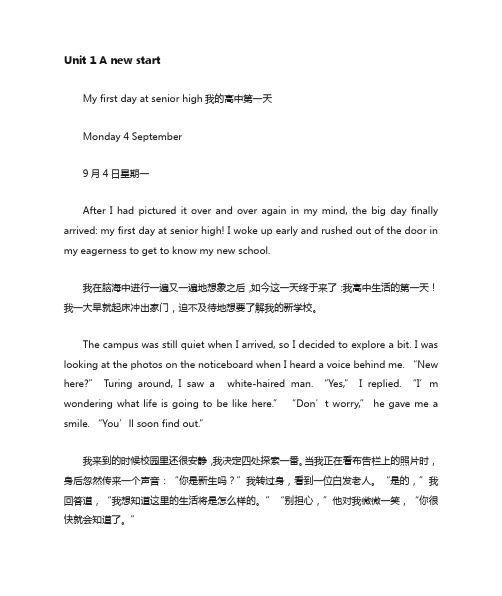
Unit 1 A new startMy first day at senior high我的高中第一天Monday 4 September9月4日星期一After I had pictured it over and over again in my mind, the big day finally arrived: my first day at senior high! I woke up early and rushed out of the door in my eagerness to get to know my new school.我在脑海中进行一遍又一遍地想象之后,如今这一天终于来了:我高中生活的第一天!我一大早就起床冲出家门,迫不及待地想要了解我的新学校。
The campus was still quiet when I arrived, so I decided to explore a bit. I was looking at the photos on the noticeboard when I heard a voice behind me. “New here?” Turing around, I saw a white-haired man. “Yes,” I replied. “I’m wondering wha t life is going to be like here.” “Don’t worry,” he gave me a smile. “You’ll soon find out.”我来到的时候校园里还很安静,我决定四处探索一番。
当我正在看布告栏上的照片时,身后忽然传来一个声音:“你是新生吗?”我转过身,看到一位白发老人。
“是的,”我回答道,“我想知道这里的生活将是怎么样的。
”“别担心,”他对我微微一笑,“你很快就会知道了。
”How true these words were! When my English teacher stepped into the classroom, I was surprised to see the same man I had met earlier.这话说得真是太对了!当我的英语老师走进教室时,我很惊讶地发现,他就是我之前遇到的那位老人。
英语书电子版

英语书电子版人教版人教版英语电子课本•高一英语必修第一册(2019版)•高一英语必修第二册(2019版)•高一英语必修第三册(2019版)•高二英语选择性必修第一册(2020版) •高二英语选择性必修第二册(2020版) •高三英语选择性必修第三册(2020版) •高三英语选择性必修第四册(2020版) •高一英语必修一•高一英语必修二•高一英语必修三•高一英语必修四•高二英语必修五•高三英语选修10•高三英语选修11•高二英语选修八•高三英语选修九•高二英语选修六•高二英语选修七•七年级英语上册•七年级英语下册•八年级英语上册•八年级英语下册•九年级英语全一册•三年级英语上册(PEP)•三年级英语下册(PEP)•四年级英语上册(PEP)•四年级英语下册(PEP)•五年级英语上册(PEP)•五年级英语下册(PEP)•六年级英语上册(PEP)•六年级英语下册(PEP)•三年级英语上册(精通)•三年级英语下册(精通)•四年级英语上册(精通)•四年级英语下册(精通)•五年级英语上册(精通)•五年级英语下册(精通)•六年级英语上册(精通)•六年级英语下册(精通)•一年级英语上册(新起点)•一年级英语下册(新起点)•二年级英语上册(新起点)•二年级英语下册(新起点)•三年级英语上册(新起点)•三年级英语下册(新起点)•四年级英语上册(新起点)•四年级英语下册(新起点)•五年级英语上册(新起点)•五年级英语下册(新起点)•六年级英语上册(新起点)•六年级英语下册(新起点)苏教版苏教版英语电子课本•高一英语必修第一册(2019版) •高一英语必修第二册(2019版) •高一英语必修第三册(2019版)•高二英语选择性必修第一册•高二英语选择性必修第二册•高三英语选择性必修第三册•高三英语选择性必修第四册•高一英语上学期模块1 •高一英语上学期模块2 •高一英语下学期模块3 •高一英语下学期模块4 •高二英语上学期模块5 •高二英语上学期模块6 •高二英语下学期模块7 •高二英语下学期模块8 •高三英语上学期模块9 •高三英语上学期模块10 •高三英语下学期模块11 •三年级英语上册•三年级英语下册•四年级英语上册•四年级英语下册•五年级英语上册•五年级英语下册•六年级英语上册•六年级英语下册•七年级英语上册•七年级英语下册•八年级英语上册•八年级英语下册•九年级英语上册•九年级英语下册•旧版一年级英语1A•旧版一年级英语1B•旧版二年级英语2A•旧版二年级英语2B•旧版三年级英语3A•旧版三年级英语3B•旧版四年级英语4A•旧版四年级英语4B•旧版五年级英语5A•旧版五年级英语5B•旧版六年级英语6A•旧版六年级英语6B北师大版北师大版英语电子课本•高一英语必修第一册(2019版)•高一英语必修第二册(2019版)•高一英语必修第三册(2019版)•高二英语选择性必修第一册(2019版) •高二英语选择性必修第二册(2020版) •高三英语选择性必修第三册(2020版) •高三英语选择性必修第四册(2020版) •高一英语必修1•高一英语必修2•高一英语必修3•高二英语必修4•高三英语必修5•高二英语选修6•高二英语选修7•高二英语选修8•高三英语选修9•高三英语选修10•七年级英语上册•七年级英语下册•八年级英语上册•八年级英语下册•九年级英语全册•三年级英语上册(三年级起点)•三年级英语下册(三年级起点)•四年级英语上册(三年级起点)•四年级英语下册(三年级起点)•五年级英语上册(三年级起点)•五年级英语下册(三年级起点)•六年级英语上册(三年级起点)•六年级英语下册(三年级起点)•旧版一年级英语上册(一年级起点) •旧版一年级英语下册(一年级起点) •旧版二年级英语上册(一年级起点) •旧版二年级英语下册(一年级起点) •旧版三年级英语上册(一年级起点) •旧版三年级英语下册(一年级起点) •旧版四年级英语上册(一年级起点) •旧版四年级英语下册(一年级起点) •旧版五年级英语上册(一年级起点) •旧版五年级英语下册(一年级起点) •旧版六年级英语上册(一年级起点) •旧版六年级英语下册(一年级起点) 教科版教科版英语电子课本•高一英语必修3•高二英语选修I-7•高二英语选修I-8•三年级英语上册(EEC)•三年级英语下册(EEC)•四年级英语上册(EEC)•四年级英语下册(EEC)•五年级英语上册(EEC)•五年级英语下册(EEC)•六年级英语上册(EEC)•六年级英语下册(EEC)•三年级英语上册(广州版)•三年级英语下册(广州版)•四年级英语上册(广州版)•四年级英语下册(广州版)•五年级英语上册(广州版)•五年级英语下册(广州版)•六年级英语上册(广州版)•六年级英语下册(广州版)•五四制六年级英语上册•五四制六年级英语下册•五四制七年级英语上册•五四制七年级英语下册•五四制八年级英语上册•五四制八年级英语下册•五四制九年级英语上册•五四制九年级英语下册鲁教版鲁教版英语电子课本•五四制六年级英语上册•五四制六年级英语下册•五四制七年级英语上册•五四制七年级英语下册•五四制八年级英语上册•五四制八年级英语下册•五四制九年级英语全册冀教版冀教版英语电子课本•高一英语必修第一册(2019版) •高一英语必修第二册(2019版) •高一英语必修第三册(2019版) •高二英语选择性必修第一册•高二英语选择性必修第二册•高三英语选择性必修第三册•高三英语选择性必修第四册•七年级英语上册•七年级英语下册•八年级英语上册•八年级英语下册•九年级英语全册•三年级英语上册(三年级起点)•三年级英语下册(三年级起点)•四年级英语上册(三年级起点)•四年级英语下册(三年级起点)•五年级英语上册(三年级起点)•五年级英语下册(三年级起点)•六年级英语上册(三年级起点)•六年级英语下册(三年级起点)•一年级英语上册(一年级起点)•一年级英语下册(一年级起点)•二年级英语上册(一年级起点)•二年级英语下册(一年级起点)•三年级英语上册(一年级起点)•三年级英语下册(一年级起点)•四年级英语上册(一年级起点)•四年级英语下册(一年级起点)•五年级英语上册(一年级起点)•五年级英语下册(一年级起点)•六年级英语上册(一年级起点)•六年级英语下册(一年级起点) 译林版译林版英语电子课本•高一英语必修第一册(2019版) •高一英语必修第二册(2019版) •高一英语必修第三册(2019版) •高二英语选择性必修第一册•高二英语选择性必修第二册•高三英语选择性必修第三册•高三英语选择性必修第四册•高一英语上学期模块1•高一英语上学期模块2•高一英语下学期模块3•高一英语下学期模块4•高二英语上学期模块5•高二英语上学期模块6•高二英语下学期模块7•高二英语下学期模块8•高三英语上学期模块9•高三英语上学期模块10•高三英语下学期模块11•三年级英语上册•三年级英语下册•四年级英语上册•四年级英语下册•五年级英语上册•五年级英语下册•六年级英语上册•六年级英语下册•七年级英语上册•七年级英语下册•八年级英语上册•八年级英语下册•九年级英语上册•九年级英语下册仁爱版仁爱版英语电子课本•七年级英语上册(科普版)•七年级英语下册(科普版)•八年级英语上册(科普版)•八年级英语下册(科普版)•九年级英语上册(科普版)•九年级英语下册(科普版) 外研版外研版英语电子课本•高一英语必修第一册(2019版)•高一英语必修第二册(2019版)•高一英语必修第三册(2019版)•高二英语选择性必修第一册(2019版) •高二英语选择性必修第二册(2019版) •高三英语选择性必修第三册(2019版) •高三英语选择性必修第四册(2019版) •高一英语必修1•高一英语必修2•高一英语必修3•高一英语必修4•高二英语必修5•高二英语选修6•高二英语选修7•高二英语选修8•高三英语选修9•高三英语选修10•高三英语选修11•七年级英语上册•七年级英语下册•八年级英语上册•八年级英语下册•九年级英语上册•九年级英语下册•三年级英语上册(Join In)•三年级英语下册(Join In)•四年级英语上册(Join In)•四年级英语下册(Join In)•五年级英语上册(Join In)•五年级英语下册(Join In)•六年级英语上册(Join In)•六年级英语下册(Join In)•三年级英语上册(三年级起点)•三年级英语下册(三年级起点)•四年级英语上册(三年级起点)•四年级英语下册(三年级起点)•五年级英语上册(三年级起点)•五年级英语下册(三年级起点)•六年级英语上册(三年级起点)•六年级英语下册(三年级起点)•一年级英语上册(一年级起点)•一年级英语下册(一年级起点)•二年级英语上册(一年级起点)•二年级英语下册(一年级起点)•三年级英语上册(一年级起点)•三年级英语下册(一年级起点)•四年级英语上册(一年级起点)•四年级英语下册(一年级起点)•五年级英语上册(一年级起点)•五年级英语下册(一年级起点)•六年级英语上册(一年级起点)•六年级英语下册(一年级起点) 北京版北京版英语电子课本•一年级英语上册•一年级英语下册•二年级英语上册•二年级英语下册•三年级英语上册•三年级英语下册•四年级英语下册•五年级英语上册•五年级英语下册•六年级英语上册•六年级英语下册鲁科版鲁科版英语电子课本•五四制三年级英语上册•五四制三年级英语下册•五四制四年级英语上册•五四制四年级英语下册•五四制五年级英语上册•五四制五年级英语下册湘教版湘教版英语电子课本•三年级英语上册(湘鲁版)•三年级英语下册(湘鲁版)•四年级英语上册(湘鲁版)•四年级英语下册(湘鲁版)•五年级英语上册(湘鲁版)•五年级英语下册(湘鲁版)•六年级英语上册(湘鲁版)•六年级英语下册(湘鲁版) 川教版川教版英语电子课本•三年级英语下册•四年级英语上册•四年级英语下册•五年级英语上册•五年级英语下册•六年级英语上册•六年级英语下册重大版重大版英语电子课本•高一英语必修第一册(2021版) •高一英语必修第二册•高一英语必修第三册•高二英语选择性必修第一册•高二英语选择性必修第二册•高三英语选择性必修第三册•高三英语选择性必修第四册•高一英语必修1•高一英语必修2•高一英语必修3•高一英语必修4•高二英语必修5•高二英语选修6•高二英语选修7•高二英语选修8•三年级英语上册•三年级英语下册•四年级英语上册•四年级英语下册•五年级英语下册•六年级英语上册•六年级英语下册粤人版粤人版英语电子课本•三年级英语上册•三年级英语下册•四年级英语上册•四年级英语下册•五年级英语上册•五年级英语下册•六年级英语上册•六年级英语下册湘少版湘少版英语电子课本•三年级英语上册•三年级英语下册•四年级英语上册•四年级英语下册•五年级英语上册•五年级英语下册•六年级英语上册•六年级英语下册接力版接力版英语电子课本•三年级英语下册•四年级英语上册•四年级英语下册•五年级英语上册•五年级英语下册•六年级英语上册•六年级英语下册闽教版闽教版英语电子课本•三年级英语上册•三年级英语下册•四年级英语上册•四年级英语下册•五年级英语上册•五年级英语下册•六年级英语上册•六年级英语下册科普版科普版英语电子课本•三年级英语上册•三年级英语下册•四年级英语上册•四年级英语下册•五年级英语上册•五年级英语下册•六年级英语上册•七年级英语上册(科普版)•七年级英语下册(科普版)•八年级英语上册(科普版)•八年级英语下册(科普版)•九年级英语上册(科普版)•九年级英语下册(科普版) 辽师大版辽师大版英语电子课本•三年级英语上册•三年级英语下册•四年级英语上册•四年级英语下册•五年级英语上册•五年级英语下册•六年级英语上册•六年级英语下册陕旅版陕旅版英语电子课本•三年级英语上册•三年级英语下册•四年级英语上册•四年级英语下册•五年级英语上册•五年级英语下册•六年级英语上册•六年级英语下册清华版清华版英语电子课本•一年级英语上册•一年级英语下册•二年级英语上册•二年级英语下册•三年级英语上册•三年级英语下册•四年级英语上册•四年级英语下册•五年级英语上册•五年级英语下册•六年级英语上册•六年级英语下册沪外教版沪外教版英语电子课本•高一英语必修第一册•高一英语必修第二册•高一英语必修第三册•高二英语选择性必修第一册•高二英语选择性必修第二册•高三英语选择性必修第三册•高三英语选择性必修第四册•七年级英语上册•七年级英语下册•八年级英语上册•八年级英语下册•九年级英语上册•九年级英语下册•五四制六年级英语上册(新世纪) •五四制六年级英语下册(新世纪) •五四制七年级英语上册(新世纪) •五四制七年级英语下册(新世纪) •五四制八年级英语上册(新世纪) •五四制八年级英语下册(新世纪) •五四制九年级英语上册(新世纪) •五四制九年级英语下册(新世纪) 沪教版沪教版英语电子课本•高一英语必修第一册•高一英语必修第二册•高一英语必修第三册•高二英语选择性必修第一册•高二英语选择性必修第二册•高三英语选择性必修第三册•高三英语选择性必修第四册。
北师大版高中英语必修一课文(电子版)
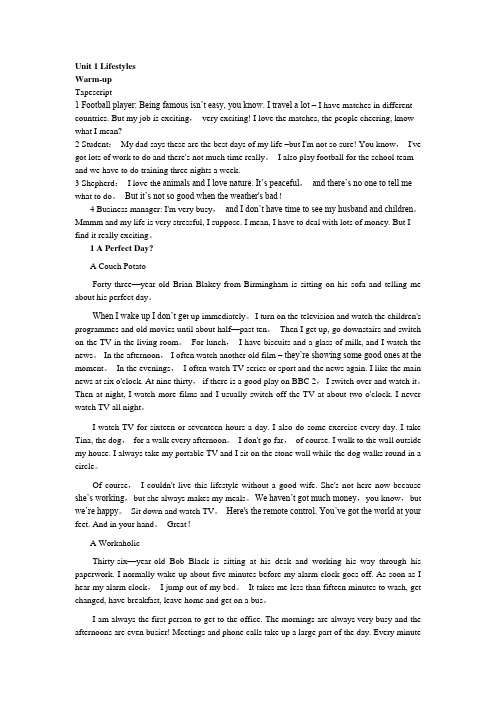
Unit 1 LifestylesWarm-upTapescript1 Football player: Being famous isn’t easy, you know. I travel a lot – I have matches in different countries. But my job is exciting,very exciting! I love the matches, the people cheering, know what I mean?2 Student:My dad says these are the best days of my life –but I'm not so sure! You know,I've got lots of work to do and there's not much time really。
I also play football for the school team and we have to do training three nights a week.3 Shepherd:I love th e animals and I love nature. It’s peaceful,and there’s no one to tell me what to do。
But it’s not so good when the weather's bad!4 Business manager: I'm very busy,and I don’t have time to see my husband and children。
Mmmm and my life is very stressful, I suppose. I mean, I have to deal with lots of money. But I find it really exciting。
人教版高一英语必修一电子课本

人教版高一英语必修一电子课本高一英语必修一电子课本目录CONTENTSUnit 1 FriendshipUnit 2 English around the worldUnit 3 Tracel journalUnit 4 EarthquakesUnit 5 Nelson Mandela - a modern hero WorkbookUnit 1 FriendshipUnit 2 English around the worldUnit 3 Travel journalUnit 4 EarthquakesUnit 5 Nelson Mandela - a modern hero AppendicesNotes to the textsGrammarWords and expressions in each unitVocabularyIrregular verbsChanges in international phonetic symbols for English 高一英语必修二电子课本目录Unit 1 Cultural reliceUnit 2 The Olympic GamesUnit 4 Wildlife protectionUnit 5 MusicWorkbookUnit 1 Cultural relicsUnit 2 The Olympic GamesUnit 4 Wildlife protectionUnit 5 MusicAppendices 附录高二英语必修三电子课本目录CONTENTSUnit 1 Festivals around the worldUnit 2 Healthy eatingUnit 3 The Million Pound Bank NoteUnit 4 Astronomy: the science of the starsUnit 5 Canada —“The True North”WorkbookUnit 1 Festivals around the worldUnit 2 Healthy eatingUnit 3 The Million Pound Bank NoteUnit 4 Astronomy: the science of the starsUnit 5 Canada—“The True North”AppendicesNotes to the textsGrammarWords and expressions in each unitVocabularyIrregular verbsChanges in international phonetic symbols for English 高二英语必修四电子课本目录Unit 1 Women of achievementUnit 2 Working the landUnit 3 A taste of English humourUnit 4 Body languageUnit 5 Theme parksWorkbookUnit 1 Women of achievementUnit 2 Working the landUnit 3 A taste of English humour Unit 4 Body languageUnit 5 Theme parksAppendices 附录高三英语必修五电子课本目录Unit 1 Great scientistsUnit 2 The United KingdomUnit 3 Life in the futureUnit 4 Making the newsUnit 5 First aidWorkbookUnit 1 Great scientists。
2023新人教版高中英语必修一全册课文及翻译(中英文Word)
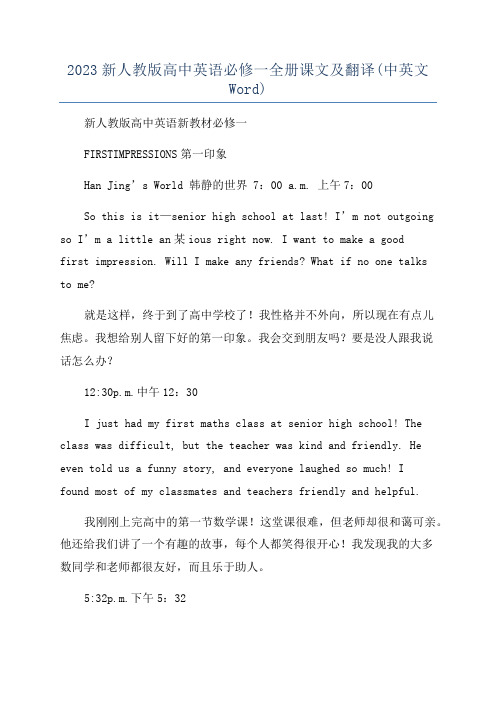
2023新人教版高中英语必修一全册课文及翻译(中英文Word)新人教版高中英语新教材必修一FIRSTIMPRESSIONS第一印象Han Jing’s World 韩静的世界 7:00 a.m. 上午7:00So this is it—senior high school at last! I’m not outgoing so I’m a little an某ious right now. I want to make a goodfirst impression. Will I make any friends? What if no one talksto me?就是这样,终于到了高中学校了!我性格并不外向,所以现在有点儿焦虑。
我想给别人留下好的第一印象。
我会交到朋友吗?要是没人跟我说话怎么办?12:30p.m.中午12:30I just had my first maths class at senior high school! The class was difficult, but the teacher was kind and friendly. He even told us a funny story, and everyone laughed so much! Ifound most of my classmates and teachers friendly and helpful.我刚刚上完高中的第一节数学课!这堂课很难,但老师却很和蔼可亲。
他还给我们讲了一个有趣的故事,每个人都笑得很开心!我发现我的大多数同学和老师都很友好,而且乐于助人。
5:32p.m.下午5:32今天下午,我们在科学实验室上了化学课。
实验室是新的,这节课也很精彩,但坐在我旁边的那个家伙一直试图跟我说话。
我无法集中精力做实验。
我真想对他说:请安静点,别烦我!10:29p.m.晚上10:29What a day! This morning, I was worried that no one wouldtalk to me. But I was wrong. I didn’tfeel awkward or frightened at all. I miss my friends from junior high school, but I believe I will make new friends here, and there’s a lot to e某plore at senior high. I feel much more confident than I felt this morning. I think that tomorrow willbe a great day!多好的一天啊!今天早上,我担心没有人会跟我说话。
(完整版)高中英语人教版必修一课文内容电子版Unit3
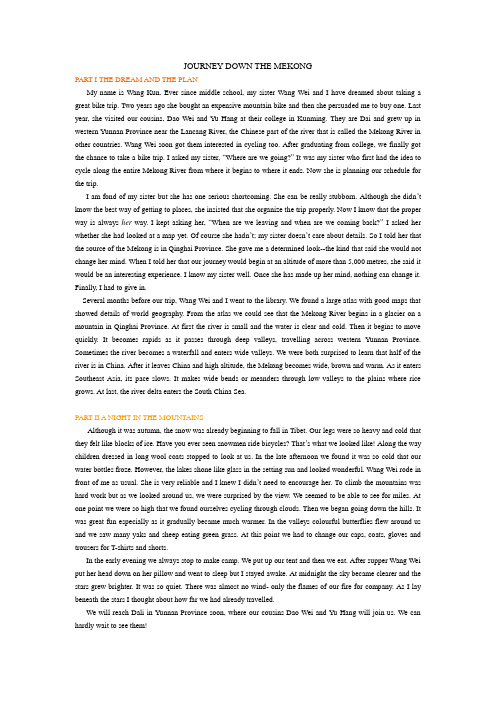
JOURNEY DOWN THE MEKONGPART I THE DREAM AND THE PLANMy name is Wang Kun. Ever since middle school, my sister Wang Wei and I have dreamed about taking a great bike trip. Two years ago she bought an expensive mountain bike and then she persuaded me to buy one. Last year, she visited our cousins, Dao Wei and Y u Hang at their college in Kunming. They are Dai and grew up in western Yunnan Province near the Lancang River, the Chinese part of the river that is called the Mekong River in other countries. Wang Wei soon got them interested in cycling too. After graduating from college, we finally got the chance to take a bike trip. I asked my sister, “Where are we going?” It was my sister who first had the idea to cycle along the entire Mekong River from where it begins to where it ends. Now she is planning our schedule for the trip.I am fond of my sister but she has one serious shortcoming. She can be really stubborn. Although she didn’t know the best way of getting to places, she insisted that she organize the trip properly. Now I know that the proper way is always her way. I kept asking her, “When are we leaving and when are we coming back?”I asked her whether she had looked at a map yet. Of course she hadn’t; my sister doesn’t care about details. So I told her that the source of the Mekong is in Qinghai Province. She gave me a determined look--the kind that said she would not change her mind. When I told her that our journey would begin at an altitude of more than 5,000 metres, she said it would be an interesting experience. I know my sister well. Once she has made up her mind, nothing can change it. Finally, I had to give in.Several months before our trip, Wang Wei and I went to the library. We found a large atlas with good maps that showed details of world geography. From the atlas we could see that the Mekong River begins in a glacier on a mountain in Qinghai Province. At first the river is small and the water is clear and cold. Then it begins to move quickly. It becomes rapids as it passes through deep valleys, travelling across western Yunnan Province. Sometimes the river becomes a waterfall and enters wide valleys. We were both surprised to learn that half of the river is in China. After it leaves China and high altitude, the Mekong becomes wide, brown and warm. As it enters Southeast Asia, its pace slows. It makes wide bends or meanders through low valleys to the plains where rice grows. At last, the river delta enters the South China Sea.PART II A NIGHT IN THE MOUNTAINSAlthough it was autumn, the snow was already beginning to fall in Tibet. Our legs were so heavy and cold that they felt like blocks of ice. Have you ever seen snowmen ride bicycles? That’s what we looked like! Along the way children dressed in long wool coats stopped to look at us. In the late afternoon we found it was so cold that our water bottles froze. However, the lakes shone like glass in the setting sun and looked wonderful. Wang Wei rode in front of me as usual. She is very reliable and I knew I didn’t need to encourage her. To climb the mountains was hard work but as we looked around us, we were surprised by the view. We seemed to be able to see for miles. At one point we were so high that we found ourselves cycling through clouds. Then we began going down the hills. It was great fun especially as it gradually became much warmer. In the valleys colourful butterflies flew around us and we saw many yaks and sheep eating green grass. At this point we had to change our caps, coats, gloves and trousers for T-shirts and shorts.In the early evening we always stop to make camp. We put up our tent and then we eat. After supper Wang Wei put her head down on her pillow and went to sleep but I stayed awake. At midnight the sky became clearer and the stars grew brighter. It was so quiet. There was almost no wind- only the flames of our fire for company. As I lay beneath the stars I thought about how far we had already travelled.We will reach Dali in Yunnan Province soon, where our cousins Dao Wei and Yu Hang will join us. We can hardly wait to see them!。
- 1、下载文档前请自行甄别文档内容的完整性,平台不提供额外的编辑、内容补充、找答案等附加服务。
- 2、"仅部分预览"的文档,不可在线预览部分如存在完整性等问题,可反馈申请退款(可完整预览的文档不适用该条件!)。
- 3、如文档侵犯您的权益,请联系客服反馈,我们会尽快为您处理(人工客服工作时间:9:00-18:30)。
高一英语必修一电子课本
1、survey n. 调查,概述;
v. 测量,检查;
e.g. a. A recent survey showed most of those questioned were for the plan.
最近的民意测验显示大多数调查对象同意这项计划。
b. The governor surveyed the damage
caused by the tsunami.
州长查看了海啸引起的破坏情况。
思维拓展:
(1). make a survey of sth. 调查…
make a general survey of sth 纵观…
(2). survey sth. 调查,评述,检查survey the equipment 检查设备
词汇派生:surveyor n. 测量员,检察员
2、add v. 增加,增添e.g. a. Shall I add your name to the list? 我可以把你的'名字写进名单
吗?
b. A new wing was added to the building. 这座大楼新添了一座边房。
思维拓展:
add up sth 把……加起来
add sth to sth 把……加到…… add to sth = increase 增加了。
add up to 合计;总共
add in 包括……;算进
指点迷津:
(1). add sth to sth 是“把……加到……上去“,add to 不能分开用,意为“增加了……”, 相当于
increase 或raise. 如:e.g. a. He added some sugar to the coffee. 他给咖啡里加了些糖。
The
bad weather added to our difficulty. 坏天气增加了我们的困难。
